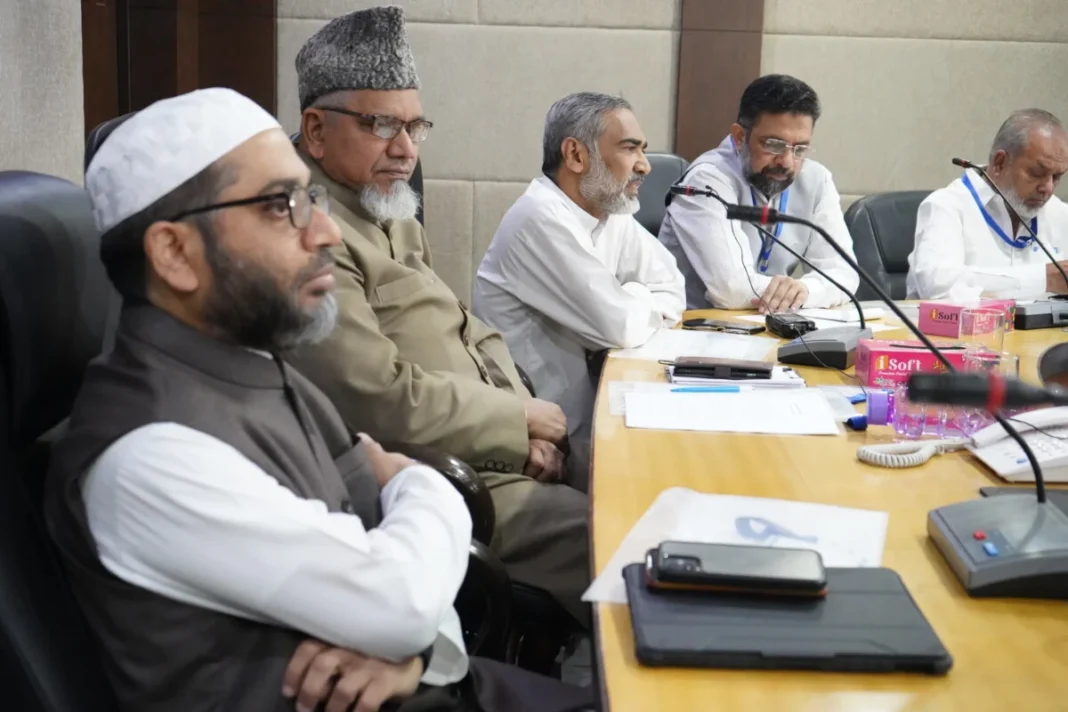M.A. BAIG
In a bid to modernize Islamic education in India, a Delhi-based national level educational body, Markazi Taleemi Board (MTB), has organized a crucial programme aimed at reshaping the curriculum of Islamic seminaries across the country. In this significant gathering of prominent figures from the educational sphere convened to address the challenges and opportunities confronting Madrasa education in the country. They addressed the pressing need for aligning this traditional Islamic education system with the rapidly evolving landscape of knowledge propelled by technological advancements.
Keynote Address by Syed Sadatullah Husaini:
In his keynote address, Jamaat-e-Islami Hind chief Syed Sadatullah Husaini underscored the imperative of adapting Islamic education to keep pace with the staggering rate of knowledge expansion globally. Husaini pointed out the growing influence of big data, algorithmic governance, and augmented reality, highlighting the necessity for a shift towards skill-oriented, lifelong learning to counter the swift obsolescence of knowledge. Identifying three pivotal factors driving the discourse on madrasa curriculum, he emphasized the interconnectedness of cultural shifts, societal challenges, and legal-political dynamics. He warned against succumbing to mere legal and political pressures in reforming madrasas, advocating instead for a holistic approach that addresses cultural changes and community needs.
Call for Role Re-evaluation by MTB Secretary Syed Tanveer Ahmed:
Echoing his sentiments, MTB Secretary Syed Tanveer Ahmed called for a re-evaluation of the role of Madrasas in contemporary society.
Major Issues and Solutions in Islamic Education System:
Noted educationist Dr. Salman Asad identified six major issues plaguing the current Islamic education system in India. These included a lack of emphasis on personality development, premature granting of ‘Aalmiyat’ degrees, a disproportionate focus on jurisprudence, neglect of modern pedagogy, inadequate language proficiency in Arabic, and insufficient integration with employment opportunities. Proposing concrete solutions, Dr. Asad emphasized the importance of a balanced curriculum that incorporates modern teaching methods, linguistic proficiency, and vocational training. Addressing the need for linguistic proficiency, Dr. Asad emphasized the importance of Arabic language education while advocating for the inclusion of Hindi, English, and interfaith studies in the curriculum. He underscored the imperative of linking Madrasa education with employment opportunities to ensure the holistic development of students.
Financial Sustainability and Resource Mobilization in Madrasa Education:
Financial sustainability emerged as a key concern, with Dr. Asad highlighting the substantial resources available through Zakat and Islamic endowments (Waqf) that could be harnessed for educational purposes.
Principles of Curriculum Design by Dr. Badrul Islam:
Dr. Badrul Islam from Maharashtra explored the principles of curriculum design, emphasizing student-centered, activity-centered, and future-centered approaches. Drawing on renowned models of curriculum design, he stressed the need for innovation and adaptability in designing an effective educational framework.
Political Climate and Communal Tensions:
Former MTB Chairman Mujtaba Farooq highlighted the challenges posed by the current political climate and communal tensions. However, he expressed optimism, citing opportunities for collaboration with diverse stakeholders to address these challenges collectively.
Modernizing Madrasas in India – Objectives:
Renowned scholar Maulana Tahir Madani outlined the dual objectives of Madrasas: safeguarding and propagating Islam. He proposed a multifaceted approach to modernizing Madrasa education, including the integration of modern subjects, language proficiency, and skill development initiatives. Madani also emphasized the importance of legal compliance and resource mobilization to ensure the sustainability of Madrasas.
Dialogue and Collaboration among Stakeholders:
In an open session, participants deliberated on proposals to redesign and restructure the Madrasa system. Concluding the discussions, MTB chairman Prof. Salim Engineer advocated for a needs-based approach focused on promoting scientific research, problem-solving skills, and innovation among Madrasa students. He proposed integrating modern teaching methods, such as project-based learning and online courses, to enhance the quality and relevance of Madrasa education. The event initiated and promoted a dialogue and collaboration among stakeholders in Madrasa education. By addressing challenges head-on and proposing innovative solutions, participants expressed optimism about the future of Madrasa education in the country. With concerted efforts and strategic reforms, Madrasas aim to explore the changing landscape while remaining true to their core traditional principles.

